Middleware developers are the backbone of seamless communication between different software applications. They ensure that various systems, databases, and applications work together smoothly, enabling efficient data exchange and process automation.
Middleware development skills include proficiency in integration technologies such as message brokers, API management, and enterprise service buses (ESBs), as well as strong analytical and problem-solving abilities.
Candidates can write these abilities in their resumes, but you can’t verify them without on-the-job Middleware Developer skill tests.
In this post, we will explore 9 essential Middleware Developer skills, 11 secondary skills and how to assess them so you can make informed hiring decisions.
Table of contents
9 fundamental Middleware Developer skills and traits
The best skills for Middleware Developers include Middleware Technologies, API Management, Integration Patterns, Security Protocols, Scripting Languages, Database Management, Performance Tuning, Troubleshooting and Cloud Platforms.
Let’s dive into the details by examining the 9 essential skills of a Middleware Developer.
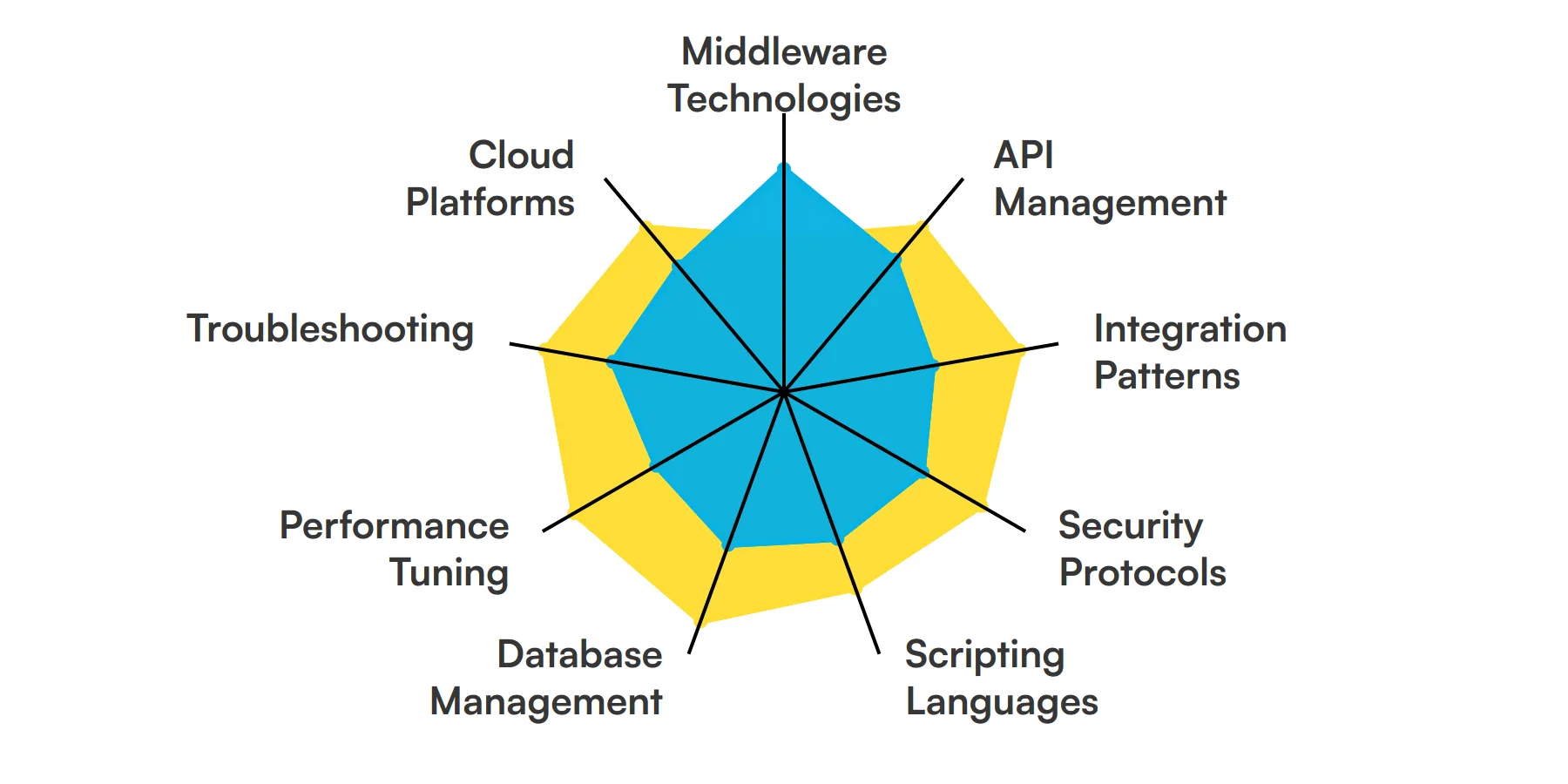
Middleware Technologies
A middleware developer must be proficient in various middleware technologies like IBM WebSphere, Oracle Fusion Middleware, and Red Hat JBoss. These platforms are the backbone of enterprise applications, enabling seamless communication and data management between different systems.
For more insights, check out our guide to writing a Middleware Developer Job Description.
API Management
Understanding and managing APIs is crucial for a middleware developer. This involves creating, deploying, and monitoring APIs to ensure they facilitate smooth interactions between different software components and services.
Integration Patterns
Knowledge of integration patterns such as message queues, publish-subscribe, and service orchestration is essential. These patterns help in designing robust and scalable middleware solutions that can handle complex data flows and interactions.
Security Protocols
Middleware developers need to be well-versed in security protocols like SSL/TLS, OAuth, and SAML. Ensuring secure data transmission and authentication between systems is a critical aspect of their role.
Check out our guide for a comprehensive list of interview questions.
Scripting Languages
Proficiency in scripting languages such as Python, Perl, or Shell is important. These languages are often used for automating tasks, managing middleware configurations, and performing routine maintenance.
Database Management
A solid understanding of database management systems (DBMS) like SQL, Oracle, and MongoDB is necessary. Middleware developers often need to integrate and manage data across various databases, ensuring consistency and reliability.
For more insights, check out our guide to writing a Database Administrator (DBA) Job Description.
Performance Tuning
Middleware developers must be skilled in performance tuning to optimize the efficiency of middleware solutions. This involves monitoring system performance, identifying bottlenecks, and implementing improvements to enhance overall system responsiveness.
Troubleshooting
Effective troubleshooting skills are essential for identifying and resolving issues within middleware environments. This includes diagnosing problems, analyzing logs, and applying fixes to ensure minimal downtime and disruption.
Cloud Platforms
Familiarity with cloud platforms like AWS, Azure, and Google Cloud is increasingly important. Middleware developers often work with cloud-based services and need to understand how to integrate and manage middleware solutions in these environments.
Check out our guide for a comprehensive list of interview questions.
11 secondary Middleware Developer skills and traits
The best skills for Middleware Developers include Version Control, Containerization, DevOps Practices, Monitoring Tools, Networking Concepts, Message Brokers, Web Services, Enterprise Service Bus, Configuration Management, Logging Frameworks and Business Process Management.
Let’s dive into the details by examining the 11 secondary skills of a Middleware Developer.
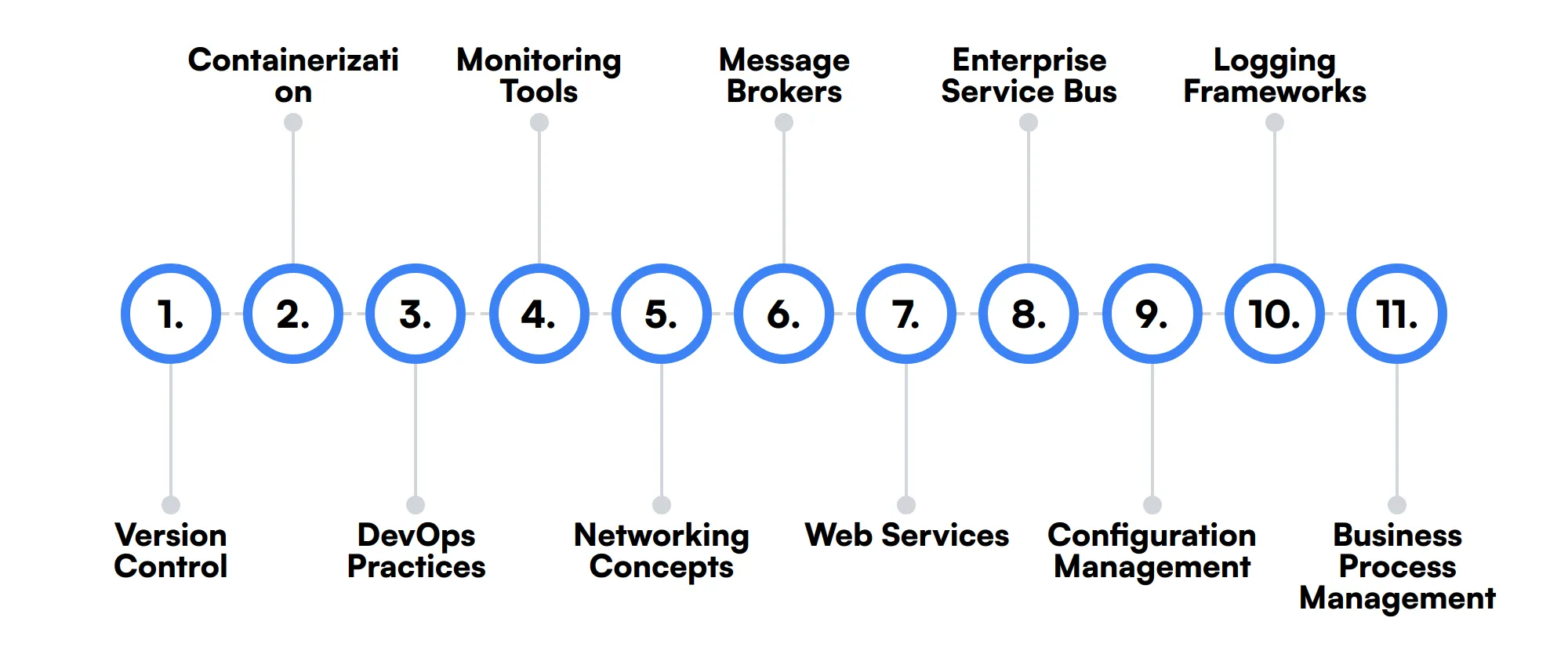
Version Control
Knowledge of version control systems like Git is beneficial. It helps middleware developers manage code changes, collaborate with team members, and maintain a history of modifications.
Containerization
Understanding containerization technologies like Docker and Kubernetes can be advantageous. These tools help in deploying and managing middleware applications in a consistent and scalable manner.
DevOps Practices
Familiarity with DevOps practices and tools such as Jenkins, Ansible, and Terraform can enhance a middleware developer's ability to automate deployments and manage infrastructure efficiently.
Monitoring Tools
Experience with monitoring tools like Nagios, Prometheus, and Grafana is useful. These tools help in tracking the health and performance of middleware systems, ensuring they run smoothly.
Networking Concepts
A good grasp of networking concepts, including TCP/IP, DNS, and load balancing, is helpful. Middleware developers often need to configure and troubleshoot network-related issues within their solutions.
Message Brokers
Knowledge of message brokers like RabbitMQ, Apache Kafka, and ActiveMQ can be beneficial. These tools facilitate communication between different systems and services in a middleware environment.
Web Services
Understanding web services, including REST and SOAP, is important. Middleware developers often work with these services to enable communication between different applications and systems.
Enterprise Service Bus
Familiarity with Enterprise Service Bus (ESB) solutions like MuleSoft and Apache Camel can be advantageous. These tools help in integrating various applications and services within an enterprise.
Configuration Management
Experience with configuration management tools like Puppet and Chef is useful. These tools help in managing and automating the configuration of middleware environments.
Logging Frameworks
Knowledge of logging frameworks like Log4j and ELK Stack is beneficial. These frameworks help in capturing and analyzing logs, which is crucial for troubleshooting and monitoring middleware systems.
Business Process Management
Understanding Business Process Management (BPM) tools like Camunda and IBM BPM can be useful. These tools help in designing, executing, and monitoring business processes within middleware solutions.
How to assess Middleware Developer skills and traits
Assessing the skills and traits of a Middleware Developer can be a challenging task. Middleware Developers need a diverse set of skills, ranging from Middleware Technologies and API Management to Integration Patterns and Security Protocols. It's not just about knowing the technologies; it's about how well they can apply this knowledge to solve real-world problems.
Traditional resumes and interviews often fall short in evaluating a candidate's true capabilities. This is where skills-based assessments come into play. By using targeted assessments, you can get a clearer picture of a candidate's proficiency in areas like Scripting Languages, Database Management, Performance Tuning, Troubleshooting, and Cloud Platforms. Adaface on-the-job skill tests can help you achieve a 2x improved quality of hires and an 85% reduction in screening time.
Let’s look at how to assess Middleware Developer skills with these 6 talent assessments.
IBM WebSphere Online Test
Our IBM WebSphere Online Test evaluates candidates on their ability to design, develop, and manage IBM WebSphere solutions. The test focuses on application server, messaging, security, clustering, and administration aspects.
The test assesses candidates' familiarity with SCA Modules, WebSphere Integration, Adaptors, JCA, and the Integrated Solutions Console. It challenges their practical skills in creating solutions that align with business requirements.
Successful candidates demonstrate a strong grasp of IBM WebSphere best practices, design patterns, and techniques, ensuring effective solution deployment.
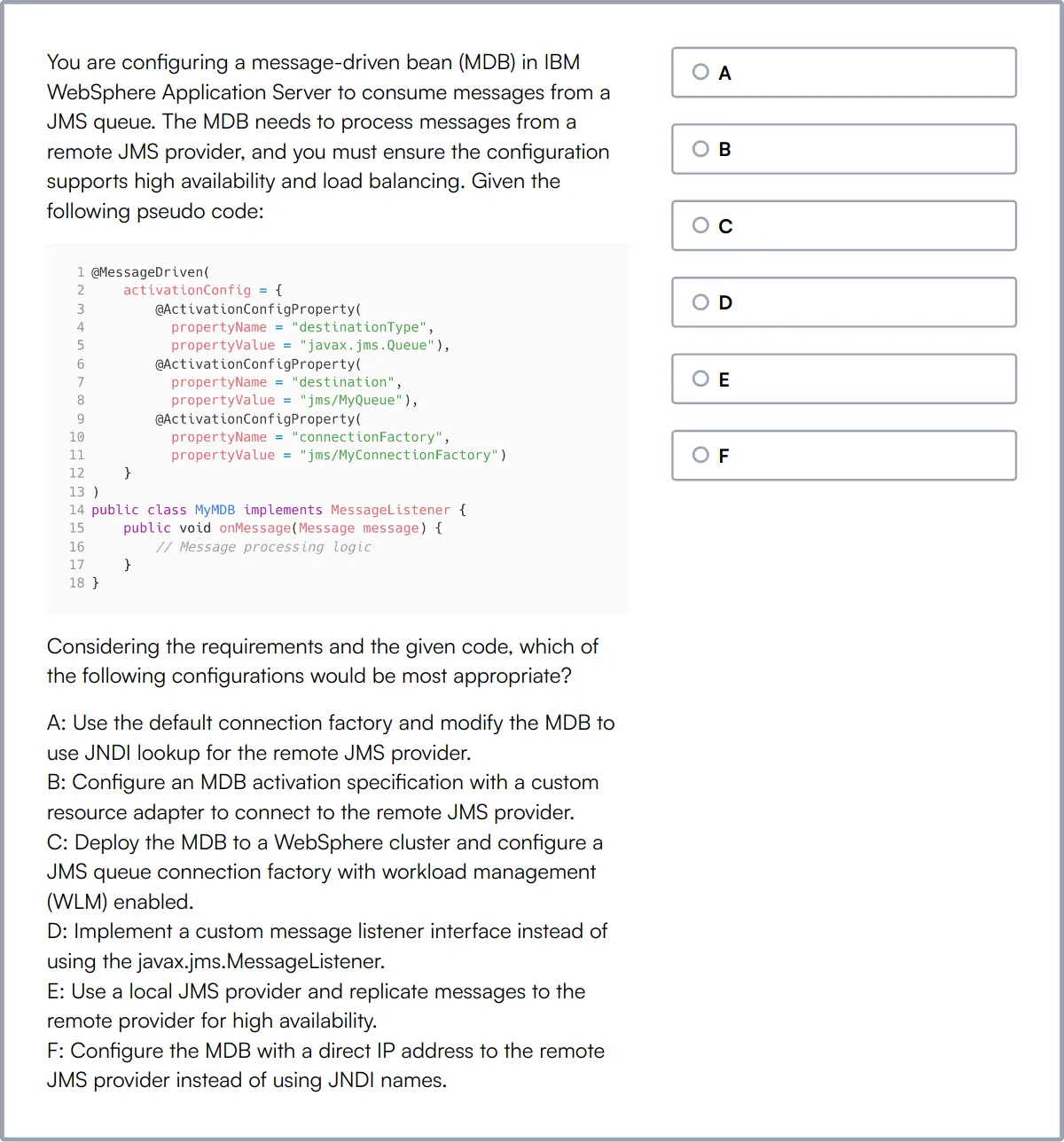
REST API Test
Our REST API Test measures a candidate's understanding of RESTful APIs, focusing on creation, interaction, and testing of these interfaces.
This test evaluates knowledge in REST API basics, API design, best practices, and backend service design. It includes questions on HTTP methods, status codes, authentication, and serialization formats.
Candidates who score well are proficient in designing and implementing secure, scalable RESTful services, and demonstrate strong coding abilities in practical scenarios.
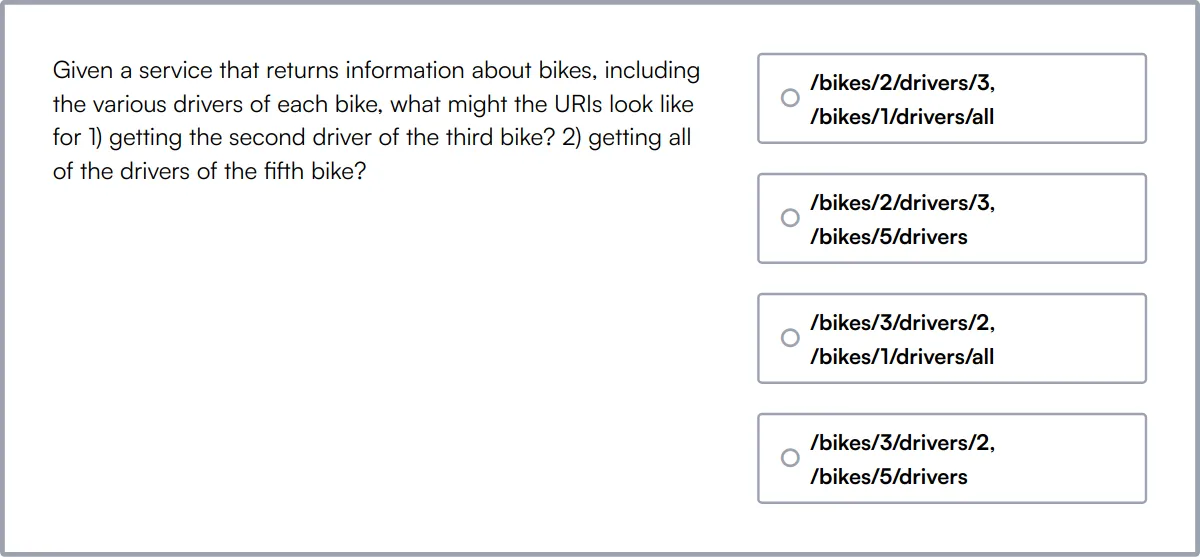
Elasticsearch Test
Our Elasticsearch Test assesses candidates on their ability to design and manage Elasticsearch environments, focusing on data indexing, search queries, and cluster management.
The test covers skills in data modeling, performance optimization, monitoring, security, and integration with other systems. It evaluates the ability to configure and optimize search queries and manage data ingestion.
High-scoring individuals are adept at scaling and distributing clusters, ensuring efficient data retrieval and robust system performance.
Cyber Security Assessment Test
Our Cyber Security Assessment Test evaluates candidates on their knowledge of cybersecurity fundamentals and their ability to protect systems against various threats.
The test examines skills in network security, cybersecurity attacks, cryptography, web security, and data security. It challenges candidates to detect risks and implement defenses against potential cyber attacks.
Candidates who excel can effectively use cryptography techniques and are proficient in setting up and managing cybersecurity defenses.
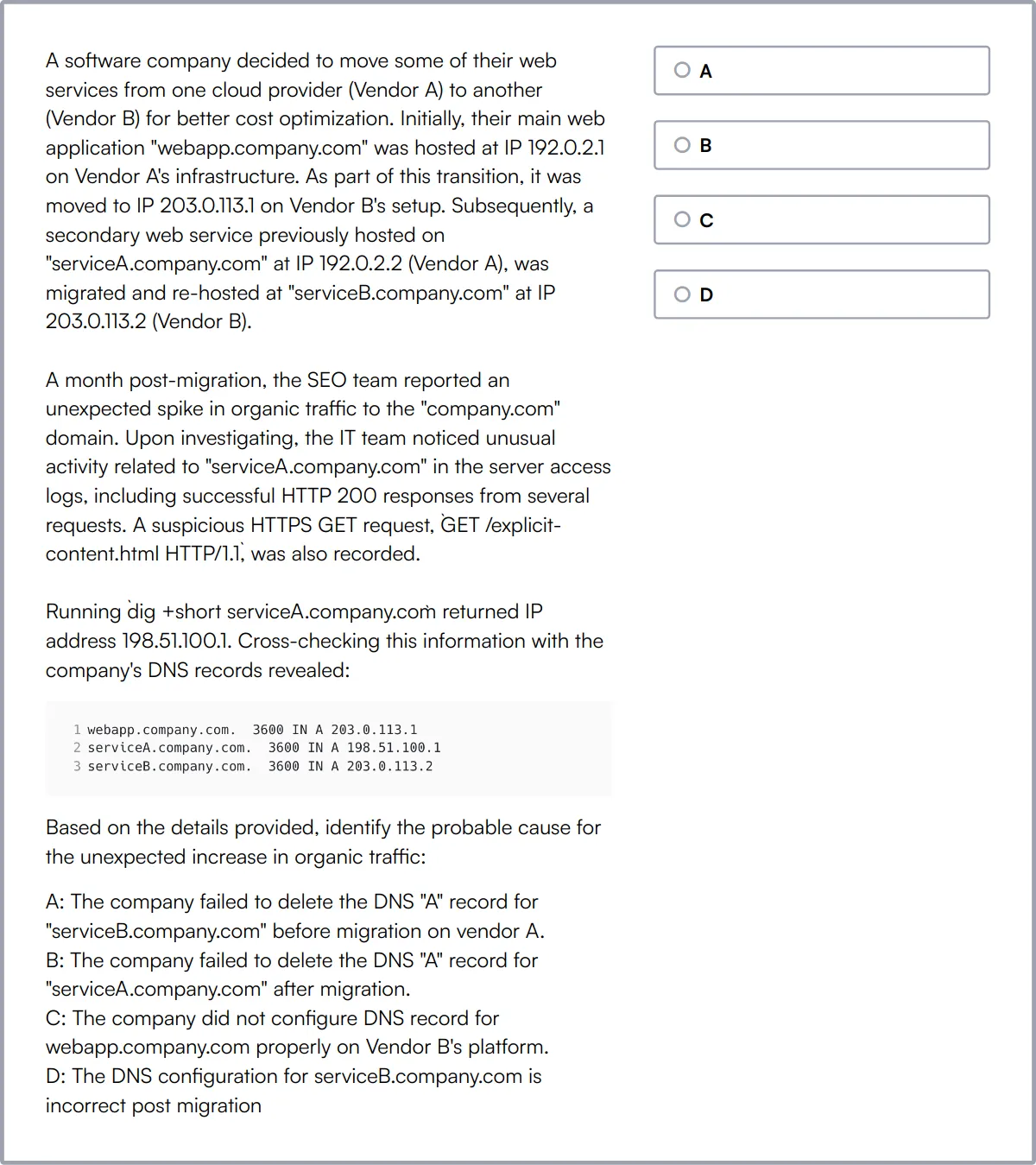
Python Online Test
Our Python Online Test gauges a candidate's proficiency in Python, covering data structures, file management, and error handling.
The assessment includes questions on object-oriented and functional programming, database manipulation, and debugging tools. It tests the ability to use Python for scripting and web scraping.
Well-performing candidates demonstrate a deep understanding of Python's capabilities and can efficiently structure and debug code.
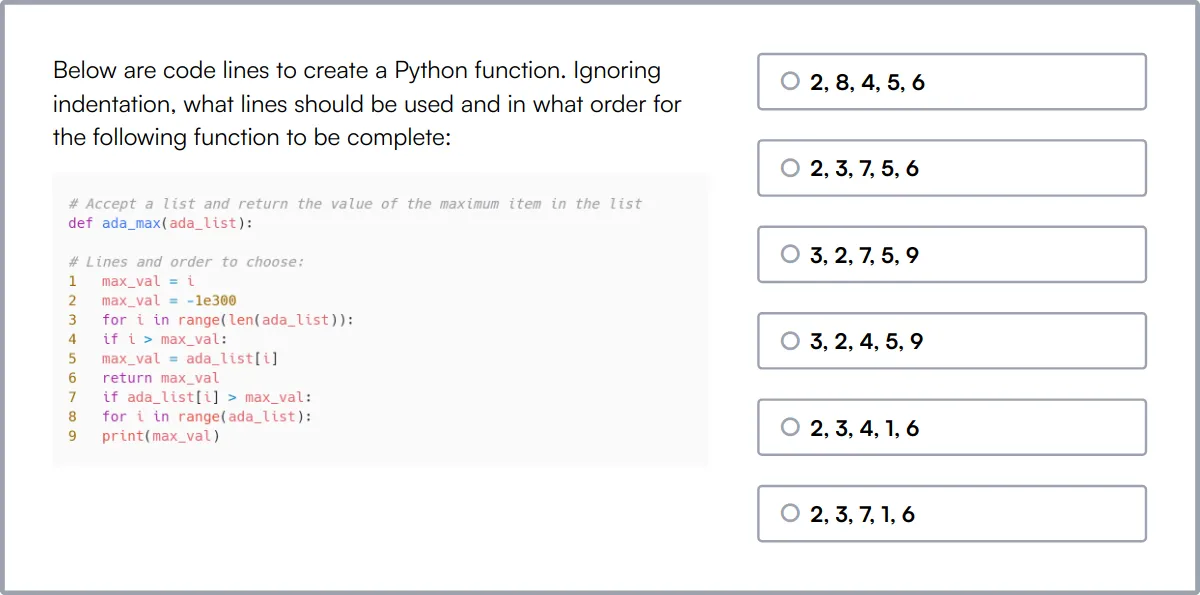
MySQL Online Test
Our MySQL Online Test assesses candidates on their expertise in MySQL, focusing on database design, SQL queries, and data manipulation.
This test evaluates proficiency in normalization, indexing, joins, views, stored procedures, and transactions. It challenges candidates to use SQL effectively to manage and manipulate data within databases.
Candidates who perform well are skilled in optimizing database queries and designing efficient database schemas that support business processes.

Summary: The 9 key Middleware Developer skills and how to test for them
| Middleware Developer skill | How to assess them |
|---|---|
| 1. Middleware Technologies | Evaluate knowledge of middleware platforms and their configurations. |
| 2. API Management | Assess ability to design, deploy, and manage APIs. |
| 3. Integration Patterns | Check understanding of common integration patterns and their applications. |
| 4. Security Protocols | Gauge knowledge of implementing and managing security protocols. |
| 5. Scripting Languages | Test proficiency in scripting for automation and task management. |
| 6. Database Management | Measure skills in database design, querying, and optimization. |
| 7. Performance Tuning | Evaluate ability to optimize system performance and resource usage. |
| 8. Troubleshooting | Assess problem-solving skills in identifying and resolving issues. |
| 9. Cloud Platforms | Check experience with deploying and managing applications on cloud services. |
Oracle SOA Online Test
Middleware Developer skills FAQs
What middleware technologies should a developer be familiar with?
A middleware developer should be familiar with technologies like IBM WebSphere, Oracle Fusion Middleware, TIBCO, and Red Hat JBoss. These platforms facilitate communication and data management between different applications.
How can you assess a candidate's API management skills?
Assess API management skills by asking about their experience with tools like Apigee, MuleSoft, or AWS API Gateway. Request examples of API design, implementation, and documentation they have worked on.
What are common integration patterns a middleware developer should know?
Common integration patterns include Message Broker, Publish-Subscribe, Request-Reply, and Data Mapping. Ask candidates to explain these patterns and provide real-world scenarios where they have applied them.
Why is knowledge of security protocols important for middleware developers?
Middleware developers must understand security protocols like SSL/TLS, OAuth, and SAML to ensure secure data transmission and authentication between systems. Ask about their experience implementing these protocols.
What scripting languages are useful for middleware development?
Scripting languages like Python, Perl, and Shell are useful for automating tasks, managing configurations, and writing custom scripts. Inquire about their proficiency and examples of scripts they have written.
How do you evaluate a candidate's troubleshooting skills?
Evaluate troubleshooting skills by presenting hypothetical scenarios or past issues they have resolved. Look for their problem-solving approach, tools used, and how they identified and fixed the issues.
What role do cloud platforms play in middleware development?
Cloud platforms like AWS, Azure, and Google Cloud offer scalable infrastructure and services for middleware solutions. Ask candidates about their experience deploying and managing middleware on these platforms.
How important is version control knowledge for middleware developers?
Version control systems like Git are essential for tracking changes, collaboration, and maintaining code integrity. Assess their experience with version control by asking about their workflow and tools used.
Assess and hire the best Middleware Developers with Adaface
Assessing and finding the best Middleware Developer is quick and easy when you use talent assessments. You can check out our product tour, sign up for our free plan to see talent assessments in action or view the demo here:

40 min skill tests.
No trick questions.
Accurate shortlisting.
We make it easy for you to find the best candidates in your pipeline with a 40 min skills test.
Try for freeRelated posts
Free resources



